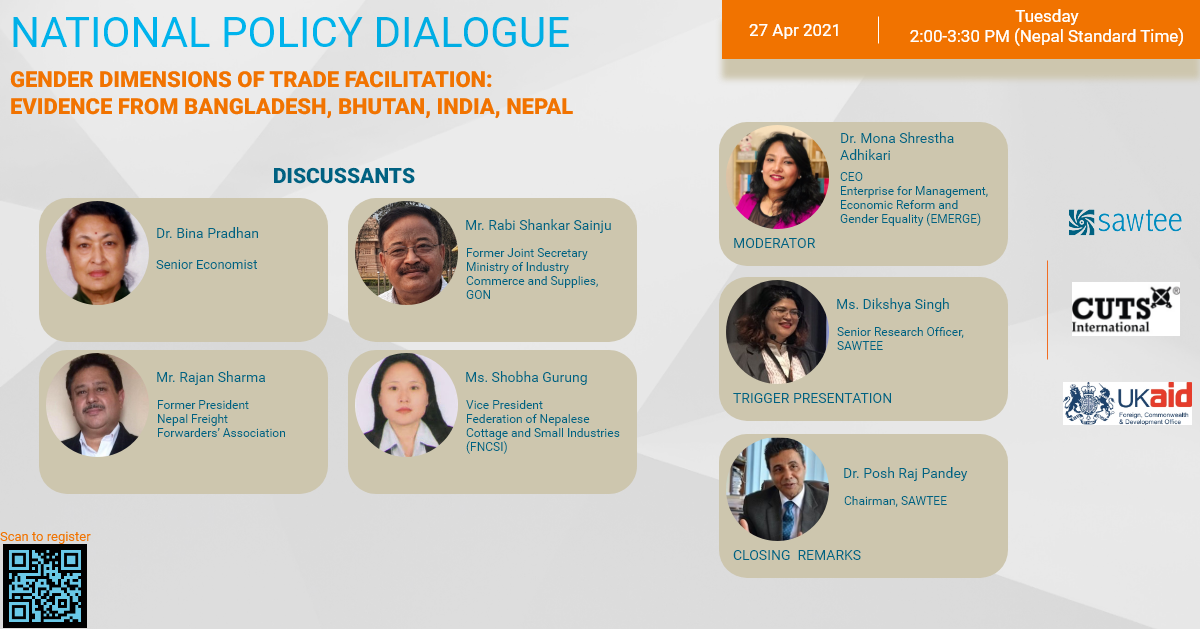National Policy Dialogue: A Webinar on Gender Dimensions of Trade Facilitation
Despite the strides made by women entrepreneurs in Nepal in the past couple of decades, their presence in cross-border trade is still minimal. Women-owned and –led businesses tend to be smaller, operating in less profitable sectors and do not usually venture into international trade. Besides the obvious constraints faced by small businesses, women-owned or -led businesses are particularly inhibited by social and cultural barriers persisting due to gender discrimination, which further contracts their participation in international trade. Even as entrepreneurs, women face difficulty in accessing information about markets, innovations, technology, and credit. The modern trading regime which is characterized by non-tariff measures that act as barriers to trade, women are further discouraged in participating in cross-border trade.
Considering these gender-differentiated constraints faced by women business owners, concerted policy efforts are necessary. The efforts need to recognize the difficulty faced by women entrepreneurs in establishing, expanding business entities and reaching far-flung markets and design policies accordingly. Economic and trade policies are no more considered to be gender-neutral as the policies have an unintended discriminatory impact on women.
Given these facts, South Asia Watch on Trade, Economics and Environment (SAWTEE), with the support from CUTS International, undertook a study ‘Gender Dimensions of Trade Facilitation: Evidence from Bangladesh, Bhutan, India, Nepal’ to examine the constraints faced by women entrepreneurs that inhibit their ability to participate in international trade. The study found that reasons for the limited participation of women entrepreneurs in international trade range from challenges caused by socially prescribed gendered norms to the gender-blind policies that inadvertently affect women’s participation in cross-border trade. This Virtual National Policy Dialogue aims to bring together policymakers, practitioners, entrepreneurs and other concerned stakeholders to discuss the issues faced by women entrepreneurs in trade and provide recommendation for concrete gender-responsive trade facilitation policies.
Objectives:
· Discuss the findings of the study undertaken that identifies the existing barriers that limit women entrepreneurs to access to cross-border trade;
· Provide evidence-based recommendation towards designing gender-responsive trade facilitation policies.
Date: 27.04.2021
Time: 2.00:3.30 PM (90 mins)
Proposed Agenda
Moderator: Dr. Mona Shrestha Adhikari, CEO, Enterprise for Management, Economic Reform and Gender Equality (EMERGE)
Trigger Presentation: Ms. Dikshya Singh, SAWTEE
Discussants:
· Dr. Bina Pradhan, Senior Economist
· Ms. Shobha Gurung, Vice President, Federation of Nepalese Cottage and Small Industries (FNCSI)
· Mr. Rajan Sharma, Former President, Nepal Freight Forwarders’ Association
· Mr. Sarad Bickram Rana, Executive Director, Trade and Export Promotion Centre (TBC)
Special remarks: Dr. Posh Raj Pandey, Chairman, SAWTEE

